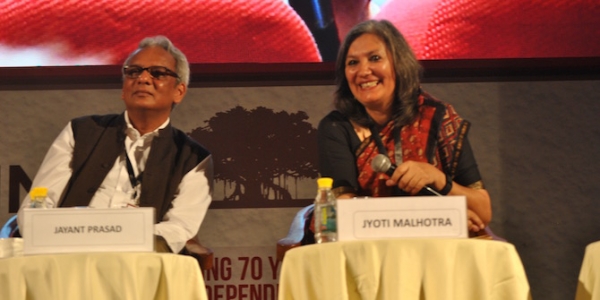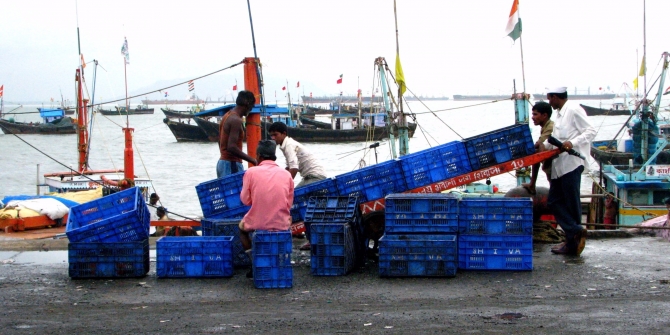 Panel 3 at India @ 70: LSE India Summit 2017 explored India’s evolving foreign policy and the challenges that could disrupt its emergence as a superpower in the medium term. In this post, Arjun Bhatia presents an overview of the key arguments presented by the panellists.
Panel 3 at India @ 70: LSE India Summit 2017 explored India’s evolving foreign policy and the challenges that could disrupt its emergence as a superpower in the medium term. In this post, Arjun Bhatia presents an overview of the key arguments presented by the panellists.
For a country of over 1.25 billion people, superlatives come in abundance. India is the world’s biggest democracy, second most populous nation, third biggest (in terms of real GDP – PPP) and fastest growing economy, second biggest food producer and third largest defence force. Even as it continues to face many social, economic, and political hurdles, India @ 70 is considered to be an emerging superpower.
LSE India Summit 2017’s session ‘India Abroad: From Third World to Regional Power’ hosted a distinguished panel of diplomats and experts who discussed the many facets of India’s resurgence and the role played by its foreign policy in influencing them. Veteran journalist and expert on foreign affairs Jyoti Malhotra opened the session by observing that India’s foreign policy has always been a ‘reflection of its domestic policy,’ right from the time of Jawaharlal Nehru to that of Narendra Modi.
Former diplomat and Director General of the Institute for Defence Studies and Analyses Jayant Prasad seconded her opinion. He expressed that India would become a leading nation by focussing on internal development, while listing its ‘prerequisites’ such as national security, clean air, potable water, public hygiene, universal health care, provision of livelihood and decent habitat, conservation of natural resources, access to commercially available energy, and transparency in governance.

Speaking on India’s rise as a regional power, Prasad stressed the need for greater commitment to building regional public goods, citing the examples of civil infrastructure projects undertaken and supported by India in Afghanistan, its grid connectivity partnerships with Bhutan, Nepal and Bangladesh, and its bilateral agreement with Iran for developing the Chabahar Port, which will open trade routes for Indian goods to enter Afghanistan and central Asia.
Former Indian Ambassador to the United States Meera Shankar also highlighted the importance of such economic diplomacy and the necessity of developing India’s manufacturing sector. She described the end of the Cold War and the opening of the Indian economy in 1991 as two key events that reshaped India’s foreign policy. India’s trade as a percentage of its GDP grew from 17 per cent in 1991 to 42 per cent in 2015. Shankar also extolled India’s efforts at balancing the goal of development with democratic rights while emphasising how India’s success would set a great precedent for the world.
‘India’s foreign policy has been a mixture of idealism and the philosophy of live and let live,’ former Foreign Secretary Kanwal Sibal said, substantiating his view by adding that India has consistently advocated disarmament, refused to join any power bloc, and showed a restrained approach to Pakistan, even after the 2008 attacks. He also described the Indus Water Treaty between India and Pakistan one of the most ‘generous’ treaties in the world. Sibal cautioned that India faces a ‘unique challenge’ in being surrounded by Pakistan and China – nuclear states that have a ‘nexus’ and ‘stake claim of India’s territory’ – and having to counter their advances by itself as it has resisted joining of any military alliance.
Former Indian diplomat andDistinguished Fellow at the Observer Research Foundation Rakesh Sood remarked that the geopolitical centre of gravity was shifting from the Euro-Atlantic to the Asia-Pacific, especially due to the rise in China’s economic and strategic influence. In this sense, India’s growth as a regional power bodes well for its progression as a global power. However, he also presented the flipside of that argument: ‘It is not just that India is changing. It is changing against a changing backdrop, which makes this transformation more challenging.’
Senior Fellow at the Carnegie Endowment for International Peace Ashley Tellis felt that India’s foreign policy since independence has been ‘remarkably successful,’ thanks to its creative diplomacy which compensated for its material deficiencies. While acknowledging that India survived the Cold War, he pointed out that India had faced no direct threat then. The present circumstances present new challenges for India with a powerful China in its neighbourhood and its cooperation with Pakistan. With the fresh threat of rising bipolarity in the world, India cannot rely on the ‘ingenuity’ of its diplomacy alone and must focus on capacity building.
Questions raised ranged from the implications of Brexit, India’s role in Afghanistan, the border dispute with China and the future of relations with Pakistan. With the participation of the Stein Auditorium audience at the India Habitat Centre, the lively discussion therefore addressed a plethora of issues regarding India’s future through a foreign policy lens.
India @ 70: LSE India Summit 2017 ran from 29-31 March 2017. Videos of all panels are available on our Facebook, and video and podcast interviews with panellists will be available on the South Asia Centre website soon.
About the Author
 Arjun Bhatia is a writer based in Delhi and is presently working on his debut novel. He has served as an Associate Editor at Inshorts, India’s biggest mobile news company, and has written for the Jaipur Literature Festival and e-Fiction India magazine. He has also co-authored an anthology of short stories called Mango Chutney. He loves listening to audiobooks, holds stand-up comedians in high regard, and recommends that you watch Before The Flood, before it floods.
Arjun Bhatia is a writer based in Delhi and is presently working on his debut novel. He has served as an Associate Editor at Inshorts, India’s biggest mobile news company, and has written for the Jaipur Literature Festival and e-Fiction India magazine. He has also co-authored an anthology of short stories called Mango Chutney. He loves listening to audiobooks, holds stand-up comedians in high regard, and recommends that you watch Before The Flood, before it floods.








Despite all growth, predictions and indicators of economic prosperity, region is heading towards a conflict because of the Kashmir Issue.
70,000 plus lives gone against the oppression and suppression. How many moments are running within Bharat against such oppression.
Views here are very much one sided of economic prosperity.